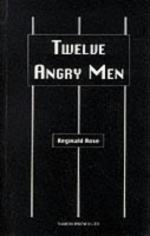
|
| Name: _________________________ | Period: ___________________ |
This test consists of 15 multiple choice questions and 5 short answer questions.
Multiple Choice Questions
1. What is a hung jury?
(a) One in which the jurors cannot reach a unanimous verdict.
(b) One in which the foreman cannot control the jurors.
(c) One in which the evidence is inconclusive.
(d) One in which the jurors recommend hanging.
2. Which juror rebukes Juror Ten for his racist comment?
(a) Juror Seven.
(b) Juror Nine.
(c) Juror Eight.
(d) The foreman.
3. Why does the dissenting juror insist they should spend time examining the evidence in detail?
(a) He believes the witnesses are unreliable.
(b) He is not certain that the defendant is guilty.
(c) He believes the presentation of the case is prejudiced.
(d) He believes that the defendant is innocent.
4. Apart from the action of the dissenting juror in Act 1, what other contributions from a juror suggest there is at least one other juror willing to stand up against the behavior of others?
(a) Juror One says people are free to disagree.
(b) The foreman orders the jurors to be orderly.
(c) Juror Six says America is a free country.
(d) A juror rebukes Juror Ten for his racist comment.
5. According to one witness, where in the apartment building did the murder occur?
(a) Downstairs.
(b) Upstairs.
(c) On the staircase.
(d) On the landing.
6. How many days has the trial been going on when the jurors begin their deliberations?
(a) Five days.
(b) Six days.
(c) Three days.
(d) Seven days.
7. Who jams the murder weapon into the wall?
(a) Juror Nine.
(b) Juror Eight.
(c) The foreman.
(d) Juror four.
8. To what age group does the defendant belong?
(a) He is middle-aged.
(b) He is a teenager.
(c) He is in his thirties.
(d) He is in his early twenties.
9. Why do the jurors take a vote before discussing the evidence?
(a) The verdict is obvious.
(b) So they can leave quickly.
(c) To get an early indication of where they stand on the verdict
(d) The judge instructs them to do so.
10. In what process does the defendant ask questions of the prosecution's witnesses?
(a) Witness examination.
(b) Reverse examination.
(c) Defense examination.
(d) Cross-examination.
11. What important facts are revealed about the circumstances of the defendant's life by the juror who votes "not guilty" in the first round of voting?
(a) He is an orphan and member of a minority group.
(b) He has been in and out of prison for stealing cars.
(c) He has had a difficult life in a ghetto without a father.
(d) He has had a difficult life in a ghetto; his mother is dead and his father has beaten him regularly.
12. At what time of year does the jury in Twelve Angry Men meet to hear testimony and determine a verdict?
(a) Summer.
(b) Autumn.
(c) Winter.
(d) Spring.
13. What two types of prejudice are evident in the comments of some of the jurors during Act 1?
(a) Prejudice against some ethnic groups and prejudice against people from certain areas.
(b) Color prejudice and racial prejudice.
(c) Prejudice against foreigners and class prejudice.
(d) Prejudice against the poor and prejudice against the uneducated.
14. Where was the victim wounded?
(a) In the stomach.
(b) In the chest.
(c) In the face.
(d) In the head.
15. What important information casts doubts on the eyewitness' story in the first discussion of the evidence?
(a) The eyewitness is old with impaired vision.
(b) The eyewitness wears glasses.
(c) The eyewitness has to walk a long way to the door after hearing the body fall.
(d) The eyewitness claims to have seen the murder through the windows of a passing elevated train.
Short Answer Questions
1. How does Juror Four challenge the defendant's alibi?
2. According to one of the witnesses, what was the defendant alleged to have shouted out to his father on the night of the murder?
3. According to the defendant, why did he buy the alleged murder weapon?
4. What term used in Act 1 establishes that the defendant is thought to have committed a murder that is intentional and deliberately planned ahead of time?
5. Where does the old man who testifies for the prosecution live?
|
This section contains 758 words (approx. 3 pages at 300 words per page) |

|




